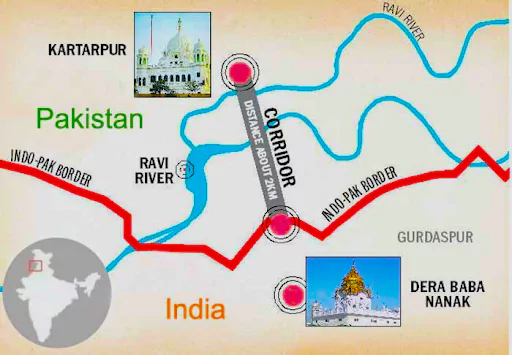Kartarpur Corridor connects India and Pakistan, allowing Sikh pilgrims to visit Kartarpur Sahib Gurdwara, symbolizing peace and religious harmony across borders.

Kartarpur Corridor is a unique and significant initiative with immense religious, historical, and political importance. It is a visa-free corridor that connects India and Pakistan, allowing Sikh pilgrims from India to visit the Kartarpur Sahib Gurdwara in Pakistan. Opened in November 2019, the Kartarpur Corridor stands as a symbol of peace, cross-border cooperation, and religious harmony.
We have created this informative guide, which explores its history, significance, the agreement between India and Pakistan, and relevance to topics like Kartarpur Corridor UPSC preparation.
Kartarpur Sahib Gurdwara is situated in Pakistan’s Narowal District which is considered as one of the most admired Sikh religious sites. This is a place where Guru Nanak Dev Ji, the founder of Sikhism, spent the last 18 years of his life. This gurdwara became a historical place after Guru Nanak Dev Ji passed away in 1539.

After the partition of India in 1947, Kartarpur Sahib ended up on the Pakistani side of the border, as the majority of Sikhs lived in India. For decades, many Indian Sikhs could only view the gurdwara from a distance across the border at Dera Baba Nanak, Gurdaspur District in India, using binoculars to see a glimpse of this holy place. The emotional connection and desire to visit Kartarpur Sahib ultimately directed the establishment of the Kartarpur Corridor.
The Kartarpur Corridor is a 4.7 km (2.9 miles) long passageway that directly links Dera Baba Nanak in India to the Kartarpur Sahib Gurdwara in Pakistan. It was inaugurated on November 9, 2019, in observance of Guru Nanak Dev Ji’s 550th birth anniversary, an event of great significance for Sikhs.
The corridor allows Indian pilgrims to visit the Kartarpur Sahib Gurdwara without a visa, although Indian people must obtain a valid passport and permit to enter the corridor. The establishment of the Kartarpur corridor is a noteworthy milestone in India-Pakistan relations while fulfilling a long-awaited aspiration of millions of Sikhs.

The Kartarpur Corridor agreement was an officially signed contract accepted by both countries, it was signed between India and Pakistan on October 24, 2019. This agreement laid the groundwork for the smooth functioning of the corridor, ensuring that the pilgrims could travel safely and easily. Some key highlights of the agreement include:
For the global Sikh community, the Kartarpur Sahib Corridor holds a huge religious and emotional significance. Guru Nanak Dev Ji is not only idiolizes as the first Sikh Guru but also as a spiritual leader whose teachings exceed boundaries and faiths. His final resting place at Kartarpur Sahib Gurdwara represents the universality of his message of peace, unity, and selfless service.
The Kartarpur Corridor has been widely praised as a “corridor of peace” between India and Pakistan, two nations that have experienced political tension and military conflicts since the 1947 partition. Despite historical enmity between these two neighbouring countries, the corridor has been a remarkable initiative that demonstrates how shared cultural and religious heritage can promote goodwill and cooperation.
However, the diplomatic dynamics surrounding the corridor are complex. While establishing the Kartarpur Sahib Corridor is a significant step towards promoting peace, political analysts point out that both countries continue to maintain their conflicting positions on issues like Kashmir.
Since its inauguration, the Kartarpur Corridor has seen many recent developments that highlight its growing importance. After a temporary closure due to the COVID-19 pandemic, the corridor was reopened in November 2021.
Kartarpur Corridor is a huge achievement, for both nations but still it faces many challenges.
Understanding the historical, political, and religious dimensions of the Kartarpur Corridor is vital for aspirants preparing for the UPSC exam. The corridor touches upon multiple aspects of the UPSC syllabus, including international relations, cultural heritage, and India’s foreign policy.
Here are a few areas where the Kartarpur Corridor could be relevant in UPSC exams:
The Kartarpur Corridor stands as a powerful symbol of religious unity and cross-border cooperation. Despite the historical tensions between India and Pakistan, the corridor has brought hope and relief to millions of Sikh devotees worldwide by granting them access to their holy shrine, Kartarpur Sahib Gurdwara. It underscores the possibility of peaceful coexistence and cultural diplomacy in a conflict-ridden region. As a bridge between nations and faiths, the Kartarpur Corridor continues to inspire hope for a future where shared heritage transcends political boundaries.
If you are preparing for UPSC 2025, then don’t delay anymore in preparing with the best guidance and top-notch resources. Join PW UPSC Online Batches today.
The Kartarpur Corridor allows Indian Sikh pilgrims to visit the Kartarpur Sahib Gurdwara in Pakistan without needing a visa, promoting peace and religious access.
Pilgrims need a valid passport, an electronic travel permit obtained through online registration, and any other identity documents specified by the Kartarpur Corridor agreement.
No, visitors must carry a valid passport to access the Kartarpur Sahib Corridor, even though they do not need a visa.
As per the Kartarpur Corridor agreement, up to 5,000 Indian pilgrims can visit Kartarpur Sahib Gurdwara each day, with the potential for increase by mutual consent.
Yes, the corridor is open daily, including on major Sikh religious occasions, allowing continuous access to Kartarpur Sahib Gurdwara.
Kartarpur Sahib Gurdwara is worshiped as the place where Guru Nanak Dev Ji, founder of Sikhism, spent his final years, representing peace, unity, and Sikh heritage.
<div class="new-fform">
</div>